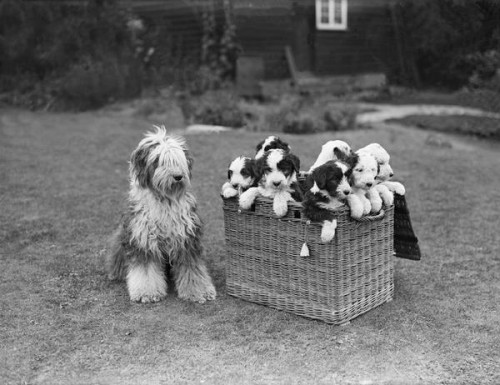
If your dog produces a litter of “rainbow puppies,” with every puppy looking like a distinctly different type of dog, she might very well have mated with more than one male. That will be especially obvious if you bred your purebred female to a purebred male and ended up with puppies that definitely aren’t that breed. Then you recall she did briefly get loose during her heat cycle…. Canine Reproduction An intact female dog generally comes into heat twice a year, approximately every six months. Small breed dogs experience more estrus cycles, perhaps as many as four per year. Very large breeds, such as great Danes, might only come into heat annually. Most dogs reach puberty at about 6 months of age. You’ll notice a bloody discharge when the cycle starts, but your dog shouldn’t get pregnant at that stage. Between a week to 10 days into the cycle, when the discharge becomes watery, the dog ovulates. However, there’s no truly safe time during heat when she can’t get pregnant, because every dog’s body is different. Multiple Fathers Once female dogs start ovulating, egg release continues over several days. Sperm can survive in the reproductive tract for a week after mating. This means if your dog mated with one dog shortly before ovulation, she could still become impregnated seven days later. Breeders usually recommend two or three matings over a few days to ensure pregnancy. Accidental breedings with different males can just as easily occur over that time period. Avoiding Accidents The easiest way to make sure your dog doesn’t get pregnant is by having her spayed. If that’s not an option because you intend to breed her, ask your vet about prescription hormone medications that can act as canine birth control. When your female dog is receptive to males, not only will she want to get out of the house, but intact male dogs in the area want to get to her. You can’t leave your female dog unsupervised for even a brief period when she’s in heat, and that includes leaving her in your normally secure fenced-in yard. If you take her out for walks, she’s leaving clues that’s she’s available every time she pees. Even if you’ve bred her deliberately, with two or more matings with the same dog, as long as she’s still receptive some strange dog could try his luck. Registration The American Kennel Club, the governing body of purebred dog registration, shows and many canine sports in the United States, recognizes that puppies in a litter might have different dads. While the AKC allows multiple-sired litter registration, the fathers must be the same breed as the mother. In order to register such a litter, the AKC requires DNA testing for the mother, potential sires and all puppies. Once the AKC determines the sires of particular puppies, registration can ensue. If one of the sires was a purebred dog of the same breed as the mother and the other was a different or mixed breed, the AKC might register the purebred puppies if DNA of all parents and puppies is submitted.